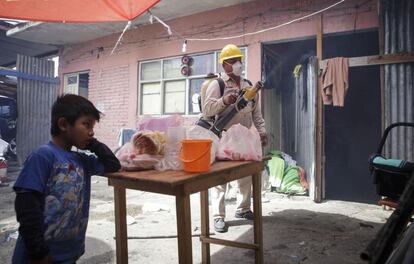Mexico preparing for spike in Zika virus infections
Health Ministry has so far confirmed 34 cases, but says that Mexico City is not a risk

The World Health Organisation (WHO) has declared the Zika virus a global health epidemic, and in Mexico the number of cases is on the rise. Three cases had been detected by the end of November, but on Tuesday the Mexican government confirmed that the number had risen to 34. The Mexican Health Ministry expects that figure to grow yet further given that there is no vaccine or treatment for the disease – it can only be prevented by controlling the mosquito population.
Mexico began preparing for the virus more than a year ago, with specific actions aimed at controlling its transmission
Mexican Health Minister Mercedes Juan first announced on Tuesday that there were 21 people infected with the virus in Mexico. But later, during the inauguration of a hospital in Puebla state at which she appeared alongside Mexican President Enrique Peña Nieto, she confirmed the number had risen to 34 cases. Juan added that Mexico had begun to prepare for the virus more than a year ago, with specific actions aimed at controlling its transmission.
At least 18 of the people infected contracted the virus on Mexican soil, most of them in the southern state of Chiapas. Before this, the WHO said Mexican authorities had reported three Zika cases in November 2015 including two domestic infections – residents of Nuevo León and Chiapas – and one imported case, in a patient who had recently traveled to Colombia.
This new disease has caused a global health emergency given that the virus is easily contracted and is difficult to control. The mosquito Aedes Aegypti is found in humid areas, especially where water is kept in storage containers. According to the WHO, when the insect bites an infected person and contracts the virus, it can then pass it on to another individual within eight to 12 days.
When the insect bites an infected person and contracts the virus, it can pass it on to another individual within eight to 12 days
Health Minister Juan said public health officials are focusing on providing medical attention to pregnant women in high-risk areas since the virus has been associated with an increase in cases of microcephaly – a neurological disorder that causes babies to be born with abnormally small heads – in South America, especially in Brazil. According to the Pan American Health Organization (PAHO), 26 countries and territories in the Americas have reported domestic Zika infections, and the organization is concerned that the number of reports of microcephaly and similar complications associated with the virus may rise.
This mosquito species is also the carrier of dengue and chikungunya. The latter caused 11,468 cases in Mexico in 2015, the highest number of cases that year in any country in the Americas, PAHO says.
English version by Dyane Jean Francois.
No risk in Mexico City
Mexico City authorities say the capital is not in danger of seeing a Zika epidemic despite the fact that there have been nine reported cases.
The city’s health secretary said those nine cases are imported because Mexico City’s geography does not have the conditions to develop autochthonous cases. “Its altitude does not allow the vector that carries the Zika virus to survive,” the city said in a statement.
According to the secretary, Mexico City has stepped up its epidemiological observation and efforts to detect new cases because the capital is a major transit route for tourists and travelers.
The new measures include monitoring mosquito species in 234 high-risk places and 98 cemeteries and the installation of 422 ovitraps. But, the city’s health emergency alert status remains low.
Tu suscripción se está usando en otro dispositivo
¿Quieres añadir otro usuario a tu suscripción?
Si continúas leyendo en este dispositivo, no se podrá leer en el otro.
FlechaTu suscripción se está usando en otro dispositivo y solo puedes acceder a EL PAÍS desde un dispositivo a la vez.
Si quieres compartir tu cuenta, cambia tu suscripción a la modalidad Premium, así podrás añadir otro usuario. Cada uno accederá con su propia cuenta de email, lo que os permitirá personalizar vuestra experiencia en EL PAÍS.
¿Tienes una suscripción de empresa? Accede aquí para contratar más cuentas.
En el caso de no saber quién está usando tu cuenta, te recomendamos cambiar tu contraseña aquí.
Si decides continuar compartiendo tu cuenta, este mensaje se mostrará en tu dispositivo y en el de la otra persona que está usando tu cuenta de forma indefinida, afectando a tu experiencia de lectura. Puedes consultar aquí los términos y condiciones de la suscripción digital.








































